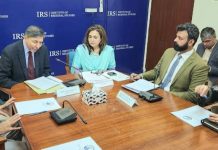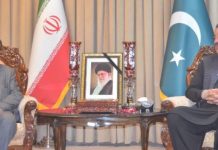DNA
KARACHI, AUG 29 – FPCCI’s Businessmen Panel Secretary General (Federal) Ahmad Jawad said Karachi needs concrete development package to uplift basic infrastructure from sevrage to drainage and good transport system and should be completed in coming three years with out any procedural hurdles.
Talking to media on Saturday, he said it is pity that in the last 20 years illegal encroachments, constructions have chocked the breathing space of this city, despite billions of revenue per year had been given to federal and provincial governments.
It’s time karachi needs proper master plan and accordingly the basic infrastructure been provided and it may be implemented through FWO and NDMA under the supervision of Sindh government and KMC with out any tug of war.“Karachi now needs $ 1 billion of capital investment to close the infrastructure gaps in the city and in this regard Council of Common Interests may released funds on priority if you want to save this city”. Jawad said.He stated an island of prosperity cannot be created amidst widespread poverty; the government has to give due attention to other parts of Sindh if it really wants to develop Karachi. This holistic approach will not only help tackle the city’s growing population but will reduce inequalities and conflict, an essential step for development and social well-being.As more than 40% of residents rely on public transport, but with 45 residents competing for one bus seat, travel within the city is difficult. Water supply is highly irregular, and rationing is widespread. The availability of water ranges from four hours per day to two hours every other day. Many households rely on private vendors who sell water from tankers at high prices. The sewage network has not been well maintained since the 1960s, and all three existing treatment plants are dysfunctional. Industrial waste, which contains hazardous materials and heavy oils, is dumped directly into the sea untreated.However It is clear this ambitious investment agenda would be difficult to achieve without difficult reforms and large amounts of private sector financing. Improving urban governance, institutional capacity, and coordination will be vital in shaping a productive and livable city. Service providers and other public institutions must explore ways to achieve cost recovery and to finance future investments. KMC must also establish systems of meaningful citizen engagement and participatory planning that consider the views of the most marginalized citizens.Jawad further added Karachi administration must find ways to leverage the many assets it already has. The city must use its land resource, built heritage, public assets, and urban spaces more productively and equitably to enhance livelihoods and provide a more liveable environment for its citizens.











